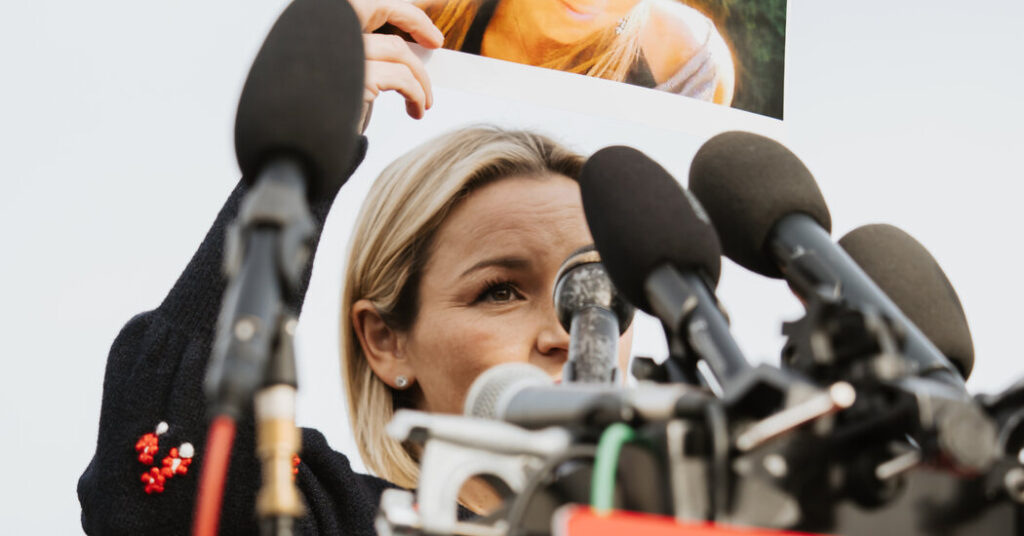If you’ve been reading the Jeffrey Epstein emails or following the discussions about them, there are names you’re probably seeing: Michael Wolff, Peter Thiel, Larry Summers, Noam Chomsky, the commoner formerly known as Prince Andrew, Peggy Siegal, Kathryn Ruemmler, Deepak Chopra. Politicians and celebrities, business leaders and academics, friends and frenemies — a boldfaced roster of the famous and the infamous who corresponded with the convicted sex offender, attended his dinner parties or sought his counsel.
There are other names you might not be seeing at all: Courtney Wild, Rachel Benavidez, Michelle Licata, Maria Farmer, Annie Farmer, Liz Stein, Jess Michaels, Marina Lacerda, Danielle Bensky, Anouska De Georgiou, Shawna Rivera. Those are some of Jeffrey Epstein’s victims, scores of whom have come forward and accused Mr. Epstein of sexually abusing them.
The women’s names have been redacted from the 20,000 pages of documents that Congress released last week. But often no redaction was necessary, because there’s no name to be covered up. In Mr. Epstein’s world, and in his gossipy, elliptical, frequently misspelled correspondence, women were often described by categories: “hawain tropic girl,” “my 20 year old girlfriend in 93,, that after two years i gave to donald,” “girls in bikinis” or, simply, “the girls,” as in, Trump “knew about the girls.” In her memoir, Virginia Roberts Giuffre, the best known of Mr. Epstein’s survivors, wrote that he “liked to tell friends that women were merely ‘a life-support system for a vagina.’” Twenty years after Mr. Trump mused about grabbing women by the genitals, Mr. Epstein’s emails are an unwelcome reminder of how some powerful men think and talk about women.
Mr. Trump’s base spent more than a year calling for the government to release its files on Mr. Epstein, in large part because the base thought they would expose powerful Democrats. Now Democrats are picking through the tranche looking for something damning about Mr. Trump.
But though we’ve heard endless details about the predators and the men in their social circle, we have heard far too little about — and from — the victims.
Perhaps the Epstein files will give liberals a tool with which to pry MAGA faithful away from the president. Perhaps they’ll give the president an excuse to prosecute political opponents. Either way, treating Mr. Epstein’s crimes as a political opportunity insults the countless women and girls he abused. They are the ones that should have been front and center through all of this, starting in 2005 when his predations began to come to light, through to the present, when they dominate the national conversation, and onward for the rest of the story’s no doubt very long life.
The world has never been kind to women who accuse powerful men of sex crimes. Despite that, Mr. Epstein’s survivors have displayed tremendous courage. They’ve given interviews and news conferences. They’ve appeared in documentaries and on podcasts. Ms. Giuffre’s memoir, “Nobody’s Girl,” is currently on best-seller lists. On Sunday, a group of survivors released a public service announcement urging viewers to ask their representatives in Congress for a “yes” vote on the Epstein Files Transparency Act bill, which is now expected to land on President Trump’s desk shortly. In a different world, Ms. Giuffre might have appeared in the video, or on talk shows. She might be headlining rallies, telling her story, explaining why this is more than a political scandal. She didn’t live long enough to have that chance.
It’s hard to tune out the gossip and listen instead to the people who paid the price for Mr. Epstein’s cruel depravity. “Victims” — like “girls” — is a category, while the boldfaced names in the emails are titillating and specific. “Girls and women harmed by powerful men” is sadly not a new story. And little can compete with the revolting sight of sophisticated, powerful people fawning over a moral leper.
Most of all, it’s hard to listen to the women because their stories are wrenching. And heartbreaking.
It’s more fun to snicker over a story about Mr. Trump leering at young women in a swimming pool, walking into a glass door and leaving his nose print behind than to hear, for example, Michelle Licata on Netflix’s documentary series “Jeffrey Epstein: Filthy Rich” recounting Mr. Epstein’s abuse. “I felt so used,” she says. “Like it was … I was just like this dirty person.”
It’s easier to smirk at Michael Wolff asking Mr. Epstein for the name of his “colonoscopy man,” or about then-Prince Andrew whingeing about his tarnished public image than it is to read, from Ms. Giuffre’s memoir, “they lent me out to scores of wealthy, powerful people. I was habitually used and humiliated — and in some instances, choked, beaten and bloodied,” or the passage in which she describes being trafficked to a man she calls “a well-known prime minister,” who she said abused her so badly that “for days, it hurt to breathe and to swallow.”
Or to read the testimony that Chauntae Davies gave at a hearing after Mr. Epstein’s death in jail: “Every day, every week I’ve spent in the hospital since, I’ve suffered and he has won. Every job offer that’s been offered to me and then retracted because of my connection to this case, I have suffered and he has won. Every public humiliation I have endured, I have suffered and he has won. Every relationship that I’ve had to end because of the abuse that I have endured by the hands of this man, I have suffered and he has won.”
Seeing Mr. Epstein write that Mr. Trump is “crazy” or “truly stupid” and that “I am the one able to take him down” is certainly more entertaining than reading the testimony of Anouska De Georgiou, who told the court, at that same hearing, “loss of innocence, trust and joy is not recoverable.” Or Teala Davies, who testified: “I’m still a victim because I am fearful for my daughters and everyone’s daughters. I’m fearful for their future in this world where there are predators in power, a world where people can avoid justice if their pockets run deep enough.”
These women are not famous or well connected, but they matter. Their pain matters. Their names matter. We should not co-opt their suffering for our own agenda. We should not value our schadenfreude more than their courage.
Jennifer Weiner, a novelist, writes frequently about gender and culture.
The Times is committed to publishing a diversity of letters to the editor. We’d like to hear what you think about this or any of our articles. Here are some tips. And here’s our email: [email protected].
Follow the New York Times Opinion section on Facebook, Instagram, TikTok, Bluesky, WhatsApp and Threads.
The post How to Utterly Miss the Point of the Jeffrey Epstein Story appeared first on New York Times.




